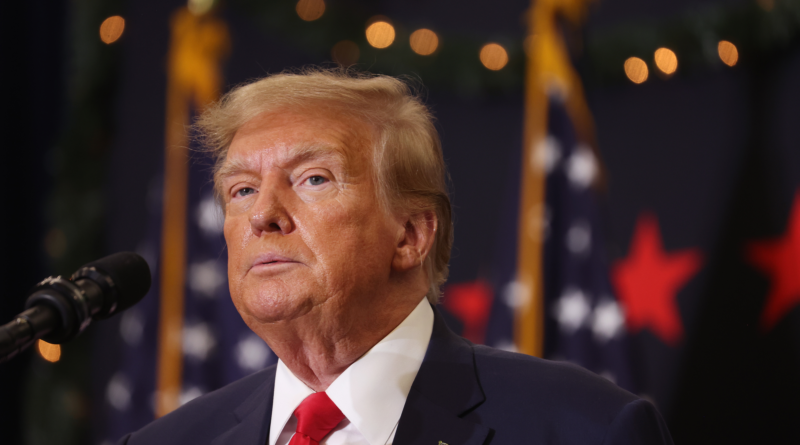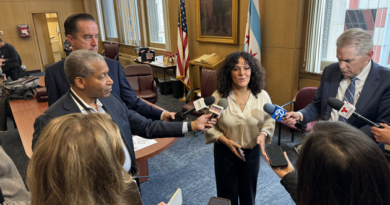Trump chooses trial over trail for the Iowa stretch run
On Tuesday, he will fly to Washington, D.C. to make an appearance in a federal appeals court for oral arguments related to his criminal trial for election interference. On Thursday, he is set to fly to New York for closing arguments in his civil fraud trial.
Neither of the appearances is mandatory. The ex-president believes he is his own best line of defense and is making a calculated bet that there is value in primary voters seeing him on trial than in meeting him on the trail.
“Every time Democrat prosecutors have dragged him through the court system it has galvanized and increased his support among Republicans. There’s no reason that should change. They’re trying to put him in jail and keep him off the ballot in as many places as they can, and Republican voters are leaping to his defense,” said Tim Murtaugh, Trump’s 2020 communications director.
Trump isn’t totally forgoing Iowa this week. In between his two court dates he will be at a Fox News town hall from the state, and he has back-to-back events Saturday and Sunday. But the split screen he is setting up by going to court during one of the most important weeks of the GOP primary is unprecedented. And it reflects one of the defining elements of the primary campaign: Trump’s courtroom trips are as important as any Iowa county visit.
In fact, his team believes they are paving the path to his nomination.
“Everyone thought that the indictments, the arrest, the charges would all be torpedoes and they’re not. In fact, he raised more money. It is bulletproofing him in the polls,” said an adviser to Trump’s 2024 presidential campaign, who spoke on the condition of anonymity to speak freely.
“So geographic challenges of traveling back and forth or that he should be on the road in Iowa, New Hampshire instead of going to this hearing – sure, those could be torpedoes for somebody else, but in Donald Trump’s hand they are resources.”
Where Trump’s legal travails end and his political demands begin is often hard to tell. He is set to have a busy legal calendar this spring. But while he is in court, his campaign will be working to amplify his message with their surrogates and TV hits. There are communications staffers dedicated to Trump’s legal cases and some of Trump’s attorneys on his cases, like Alina Habba, appear on cable news to hammer home her boss’s case.
Trump’s rivals have openly acknowledged that they
believe it has skewed the race to his benefit. Trailing him by double digits, they haven’t just largely refrained from attacking him over his court appearances, they’ve actively rushed to his defense, calling the trials political.
“It’s an unusual caucus all the way around,” said Iowa evangelical leader Bob Vander Plaats, who is supporting Florida Gov. Ron DeSantis. “I think it was Trump
who quipped one time, ‘all I need is another indictment or two and I’m the nominee.’ So there’s no doubt that’s been a galvanizing point.”
Trump’s team is acutely aware of the dynamic, seeing a political advantage in playing up the legal drama. On Monday, his campaign put out a fundraising email in which they said Trump would “reportedly” be “forced off the campaign trail and into courtrooms.”
It was entirely false. The appearances are voluntary, as have been the majority of the many appearances he has made at his civil trial in New York since it began in October.
During the trial in Manhattan, Trump has often treated court like an extension of his campaign, giving sometimes lengthy remarks as he enters and exits the proceedings before dozens of news cameras arranged at the entrance to the courtroom.
He acknowledged while testifying that he wanted to draw attention to the trial, saying, “This is a very unfair trial — very, very — and I hope the public is watching.” And at one point, the judge, Justice Arthur Engoron, instructed Trump’s lawyer to try to restrict his client to answering the questions asked of him, saying: “This is not a political rally. This is a courtroom.”
Trump’s planned appearance in court Tuesday is especially notable because not only is it not mandatory, it is atypical for a defendant to choose to attend a proceeding that is largely about legal interpretation.
An “appellate court argument is about the state of the law, which a defendant is not really well equipped to contribute,” said Temidayo Aganga-Williams, a former federal prosecutor with the Brooklyn U.S. attorney’s office who also served as senior investigative counsel for the House Jan. 6 select committee.
He added that given the nature of the cases typically seen by the D.C. court — high-profile matters often involving powerful government officials — and the fact that the appellate courts are generally a more “somber or stoic experience,” the judges are unlikely to be receptive to the type of bombastic rhetoric and courtroom drama that Trump’s lawyers and Trump himself have displayed during the civil trial in New York.
“I think there will be very little patience at the D.C. circuit to turn the proceedings into something more theatrical,” he said. “That’s more framed to a political audience.”
Trump will likely once again address the press when he is in court this week, if only to shift the spotlight away from his rivals’ bus tours and baby kissing in Iowa.
But while the courtroom drama has bolstered Trump in the primary, it is unclear what impact it could have in the general election should Trump win the nomination. Trump would be competing for independent and suburban voters, and how they view his legal fights could be critical to determining the outcome of the election.
Trump’s intersecting legal and political calendars will only become more intertwined over the course of the next few months. He has a federal civil trial set to begin next week in a defamation lawsuit brought by the writer E. Jean Carroll, a federal criminal trial that could begin as soon as early March in the election interference case brought by special counsel Jack Smith and a New York state criminal trial scheduled for late March in the case related to Trump’s hush money payments to a porn star. He also has a federal criminal trial slated for May 20 in the case in which he is charged with mishandling classified documents.
In addition to pretrial court dates and filings that will occupy Trump’s attention, his appearance at the criminal trials, which are set to last at least several weeks apiece, is mandatory, meaning he is set to be in a courtroom from morning to night every weekday during a stretch of time that includes the Super Tuesday primaries and the weeks preceding the Republican National Convention.
With reporting by Alex Isenstadt



